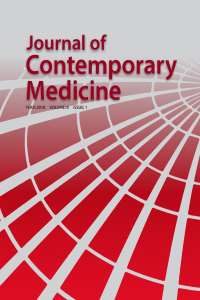COVID-19 Pnömonisi Sonrası AntiHBs Değerlerindeki Değişiklikler
COVID-19, antiHBs değerleri, değişen titreler.
The Changes In The AntiHBs Values Following COVID-19 Pneumonia
COVID-19, antiHBs values, changing titers.,
___
- 1. Horby P, Lim WS, Emberson JR, et al. Dexamethazone in Hospitalized patients with COVID-19-preliminary report. The new England Journal of Medicine. 2021 Feb25; 384(8):693704. PMID: 32678530 doi:10.1056/NEJMoa2021436.
- 2. Koffas A, Dolman GE, Kennedy PTF. Hepatitis B virus reactivationin patients treated with immunesuppressive drugs: a practical guide for clinicians. Clin Med(Lond). 2018 Jun; 18(3):212-218. PMID: 29858430 doi: 10.7861/clinmedicine.18-3-212
- 3. Lubel JS, Testro AG, Angus PW. Hepatitis B Virus reactivation following immunesuppressive therapy: guidelines for prevention and management. Intern Med J. 2007 Oct;37(10):705-12. PMID: 17894766 doi: 10.1111/j.1445-5994.2007.01479.x.
- 4. Colson P, Borentain P, Coso D, et al. Hepatitis B virus reactivation inHbsAg negative patients is associated with emergence of viral strains with mutated HBsAg and reverse transcriptase. Virology, 2015oct, 484:354-363. PMID: 26186574 doi: 10.1016/j.virol.2015.06.017.
- 5. Rodriguez-Tajes S, Miralpeix A, Costa J, et al. Low risk of hepatitis B reactivation in patients with severe COVID-19 who receive immunosuppressive therapy. J Viral Hepat. 2021 Jan 28(1):89-94. PMID: 32969557 doi:10.1111/jvh.13410.Epub 2020 dct 12.
- 6. Perillo RP, Gish R, Falek-Ytter YT. American Gastroenterological Association Institute technical review on prevention and treatment of hepatitis B virus reactivation during immunosuppressive drug therapy. Gastroenterology.2015;148:221-44. PMID: 25447852 doi: 10.1053/j.gastro.2014.10-038
- 7. Yalcin Kehribar D, Okuyucu M, Ozgen M, Ketenci YB, Ayyıldız T, Yıldırım B. Impact of tumor necrosis factor alpha antagonist treatment on antibody titer of hepatitis B surface antigen. J Surg Med. 2020; 4(8):678-681 doi:10.28982/josam.777871
- 8. Cho Y, Yu SJ, Cho EJ, et al. High titers of anti-HBs prevent rituximab related viral reactivation in resolved hepatitis B patients with non-Hodgkin’s lymphoma. J Med Virol.2016 Jun;88(6):1010-7. PMID: 26531242 doi:10.1002/jmv.24423
- 9. Tamori A, Koike T, Goto H, et al. Prospective study of reactivation of hepatitis B virus in patients with rheumatoid artrhritis who received immunosuppressive therapy, evaluation of both HBsAg positive and HBsAg negative cohorts. J Gastroenterol.2011;46:556-64. PMID: 21246383 doi: 10.1007/s00535-010-0367-5
- 10. Vassilopoulos D, Apostokopoulou A, Hadziyannis E, et al. Long term safety of anti-TNF treatment in patients with rheumatic diseases and chronic or resolved hepatitis B virus infection. Ann Rheum Dis.2010;69:1352-5. PMID: 20472596 doi: 10.1136/ard.2009.127233
- 11. Guglielmo D, Alessandra Toletone A, Barberis I, et al. Persistance of protective anti-HBs antibody levels and amnestic response to HBV booster. Vaccination: A cross-sectional study among healthcare students 20 years following in Italy. Hum vaccine Immunother.2017 Feb;13(2):440-444. PMID: 27925503 doi:10.1080/21645515.2017.1264788.
- Yayın Aralığı: Yılda 6 Sayı
- Başlangıç: 2011
- Yayıncı: Rabia YILMAZ
Pediatrik akut apandisitlerde , preoperatif beslenme değerlendirilmesi klinik sonuçları etkiler mi?
İlknur BANLI CESUR, Zerrin ÖZÇELİK
Inflamasyon ilişkili indeksler, palyatif bakım hastalarında kötü prognozu tanımlayabilir mi?
Ufuk ÜNLÜ, Nagihan YILDIZ ÇELTEK
SGLT-2 İnhibitörleri’nin Kısa Vadede Rutin Laboratuvar Parametreleri Üzerine Etkisi
Hüma BÖLÜK ŞENLİKCİ, Sevgi İKBALİ AFŞAR
Şok İndeksi ve GFR’nin Perfore Apandisit Ayırıcı Tanısındaki Klinik Önemi
Hepatik Ensefalopati Tip C Hastalarında Tetikleyici Faktörler ve Kliniko-Endoskopik Çalışma
Harshal KHOBRAGADE, Tanuja MANOHAR, Amol SATHAWANE
COVID-19 Pnömonisi Sonrası AntiHBs Değerlerindeki Değişiklikler
Perihan ÖZKAN GÜMÜŞKAYA, Özgür ALTUN, Nur KARAKÜTÜK YÜZTAŞ, Neslihan ÖZSOY, Gülten AYDIN TUTAK, Emine YILDIRIM, Mine ADAŞ, Mehmet KÜÇÜK
